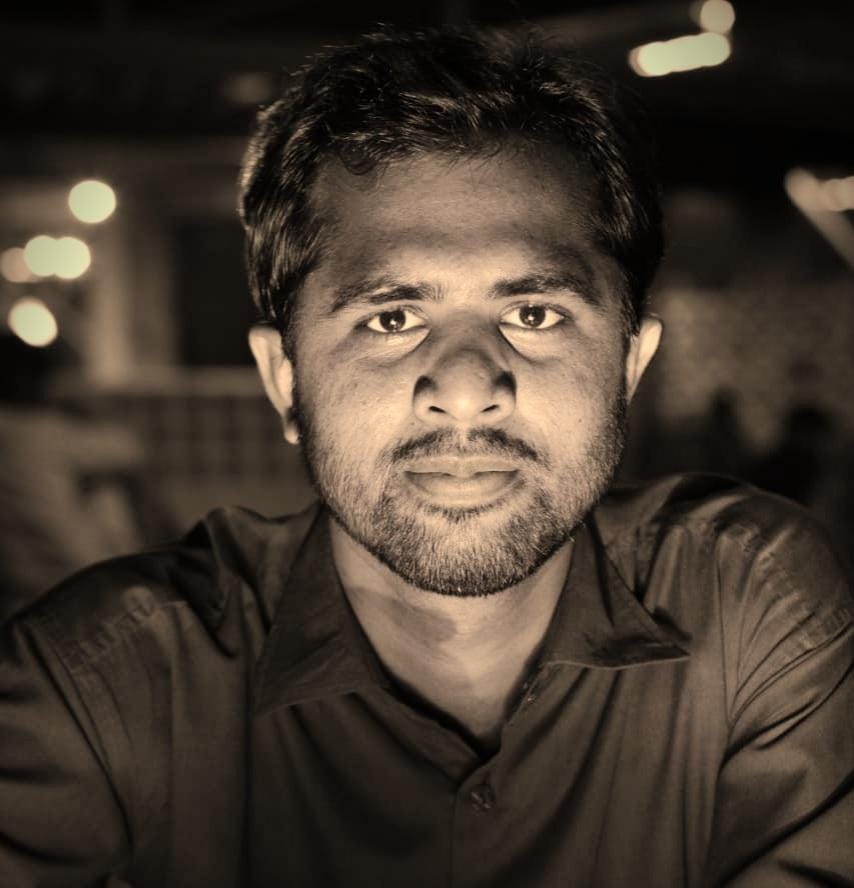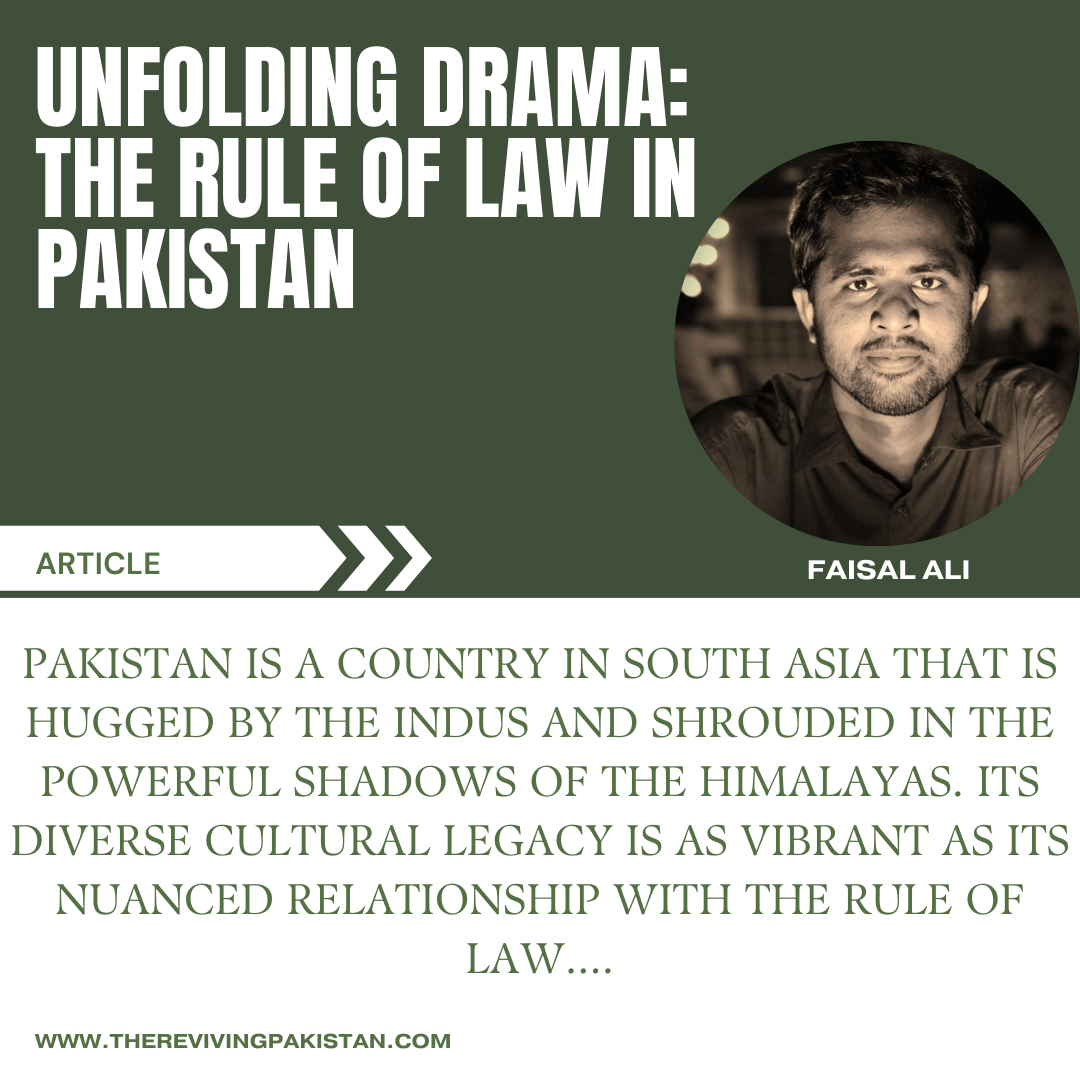About the author(s)

Faisal Ali
The author is an independent researcher having keen interest in domestic affairs, foreign policy, geopolitics, and international relations.
Pakistan is a country in South Asia that is hugged by the Indus and shrouded in the powerful shadows of the Himalayas. Its diverse cultural legacy is as vibrant as its nuanced relationship with the rule of law. A place where the murmur of courtroom intrigue and the din of street rallies frequently drown out the melody of the sitar and the rhythm of the tabla. The rule of law is shaky here, in the birthplace of ancient civilizations, like a candle flickering in a violent rain.
Imagine a complex tapestry woven into the fabric of society, with each thread representing a lineage of judicial precedents. However, as time went on, some of these threads became frayed as a result of pressure from the opposing forces of social unrest, corruption, and power. There are now evidence of wear and tear on the delicate weave, casting a shadow over civil justice and governance. This is not the Pakistan that its founders intended or the Pakistan that the outside world knew. Now we have an alternate world, a fictitious situation in which the rule of law faces numerous difficulties. Every person in this made-up world feels the weight of uncertainty, and justice appears to be as elusive as the legendary Simurgh.
From the majestic courts of Islamabad to the bustling streets of Karachi, the decree of law has been enshrouded in ambiguity. The pen that once drafted laws to protect the weak now quivers, as might often trumps right. It’s an environment where legal sanctuaries turn into labyrinths of loopholes and red tape. Where judges are being forced to give verdict in certain cases against certain parties. Where Agencies are controlling the judges and managing them. Where calls are being recorded on the basis of Lawful Interception Management System as reported by the Islamabad High court’s judge Justice Babar Sattar in recent Bushra Bibi Audioleaks Case order.
So what caused the foundations to tremble? Were the stones of justice always brittle, or did the tremors of societal imbalances and historical upheavals weaken them? Corruption took root in the fertile grounds of poverty and illiteracy, strangling the sprouts of fair jurisprudence. Political instability and the shadows of militarism stretched like creeping vines, eclipsing the laws meant to govern with a steady hand. And the vestiges of colonial legal systems, instead of adapting to local needs, became square pegs for round societal holes. Resultantly, the judiciary has fallen so low on the World Justice Project’s Rule of Law Index Ranking at 132 out of 142 countries. Moreover, the politicization of the Supreme court as institution since past decade has created a trust deficit between the public and judiciary itself. Resultantly, one witnesses the controversial decisions by the judiciary ranging from Nawaz Sharif’s Aqama Case to the Controversial Bat symbol case which itself is being criticized by the member judges or the supreme court. All these decisions has led judiciary and the constitution into sway. Hence, these decisions has created a wave of political instability across the country. Resultantly, the the revival of TTP is being witnessed, and government is thinking to launch 9th military operation this time under the name of Azm e Istehkam which itself is being criticized across the country. Lack of consensus is further creating a void in the trust between govt and the common public.
The ramifications are both profound and heart-breaking. People are losing faith in the legal system, and there is a growing perception that authority rather than the law should be the final arbiter of conflicts. Foreign and local investors hesitate at the gates of trade, not knowing if agreements would be kept or if whims will win out. Moreover, IMF forces the government to increase the taxes on daily life usage things such as Electricity, gas and Gasoline. This further extends the level of hatred against the top leadership of the country in the hearts of common public. This hatred has made people to question the military establishment about their choice for the common, and choosing the corrupt leadership of the nation.
So the most vulnerable people suffer the most, whether they are in rural areas or on the corners of dusty streets; this creates a vicious circle of hopelessness and disenfranchisement. Hence in response, people do take law in their hands and incidents like Madayn and Jarianwala do occur. However, there is still a glimmer of promise within this imaginative musing. What changes could kindle it into a blaze strong enough to show Pakistan’s rule of law on a new course? Could the history of this country be rewritten by a resurgence of legal caution supported by civic engagement and technology advancements? The scene is prepared, scenarios are envisioned, and the world observes the drama of Pakistan’s rule of law as it plays out, either with optimism or fear.

